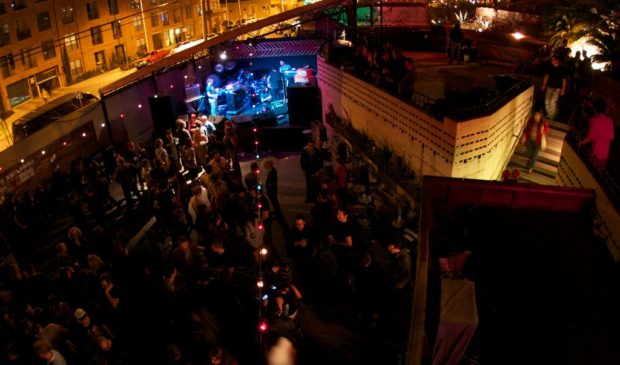Urban Land Institute considers future of Red River venues
Thursday, June 29, 2017 by
Chad Swiatecki Keeping live music venues alive in one of Austin’s most important creative districts will take a combination of innovative public policy, private investment dollars and cooperation of club owners that have long failed to work as a collective.
That was the consensus Wednesday at the Urban Land Institute’s monthly member breakfast, which gathered over 100 leaders in real estate, local government and the legal community to consider how Austin can protect the Red River Cultural District, seen by many as the most active and important cluster of live music venues in the city that calls itself the world’s live music capital.
The gathering came about following a recently released report from the Urban Land Institute that found the district that runs between Sixth and 10th streets is under intense development pressure that could force many of the 13 clubs friendly to live music to close their doors in the near future. Included in the group’s test access panel was the statement that “the district is currently in the ‘11th hour’ regarding the ability to comprehensively maintain the health of its live music scene.”
Wednesday’s discussion featured attorney Dan Wheelus, who is assisting Austin real estate mogul Gary Keller in his music industry growth and preservation efforts; Christine Maguire, redevelopment division manager in Austin’s Economic Development Department; and Cody Cowan, general manager of the Mohawk nightclub.
Wheelus said Austin can’t rely on more last-ditch efforts like Keller’s purchase last year of the Saxon Pub property at a premium price to save the club from being demolished in favor of a mid-rise condominium development. Pointing to the willingness of cities like Nashville choosing to invest heavily in creative economy efforts and poach musicians and creative talent, Wheelus said the onus is on Austin powerbrokers to do their part.
“It will take incredible planning and commitment to musicians and venues to keep all these puzzle pieces together,” he said. “The challenge is before us. What can we do for these venues?”
Wheelus also laid out some of the incentive deals and financing structures he and Keller have discussed with city leaders – including a complicated conservation easement scheme – as potential tools to help low-margin music venues survive in the face of development pressures and expected drastic rent increases.
Maguire said shadows looming over the Red River district extend further into the lack of affordable housing and middle class jobs that are forcing families and creatives to move far away from Austin because of the city’s high cost of living.
“If the answer is push it out to Pflugerville, if the answer is push it out to Kyle, then how is that a workable solution for the life and vibrancy of Austin as an inclusive economy?” she asked. “That requires heavy lifting from land use regulation and financial incentives and us collectively to come up with a robust collection of policy and tools to engage the public sector, and private sector capital, to achieve public benefits.”
Cowan brought the early morning crowd to applause multiple times, sharing his perspective from 20 years of club management and as a working musician, recalling that in the late 1990s downtown Austin was sleepy enough that “you could park your car on the sidewalk and no one cared, because there were no rules.”
With those low-stakes days long gone, Cowan said the time has come for local leaders to work with venue operators and property owners to preserve music and solve the ongoing “human tragedy” of illicit drug and sex activity outside the nearby Austin Resource Center for the Homeless.
“Change is inevitable, and we’re not here asking for a handout,” he said. “We need solutions that come from outside of (venue operators’) toolset. Red River has grown organically and out of more than a dozen venues only one of us owns the property. I don’t see one plot of land anywhere else in the city where we can move 13 live music venues and it’ll be all hunky dory.”
Photo by Nash Cook made available through a Creative Commons license
The Austin Monitor’s work is made possible by donations from the community. Though our reporting covers donors from time to time, we are careful to keep business and editorial efforts separate while maintaining transparency. A complete list of donors is available here, and our code of ethics is explained here.
You're a community leader
And we’re honored you look to us for serious, in-depth news. You know a strong community needs local and dedicated watchdog reporting. We’re here for you and that won’t change. Now will you take the powerful next step and support our nonprofit news organization?










